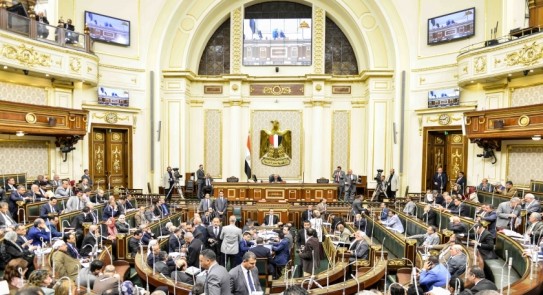Israel began exporting natural gas to Egypt in mid-January, in an event described as “historic” and “an important development that serves the economic interests of both countries.” The deal sparked a lot of resentment and anger among the Egyptian public, which consider Israel a historic enemy of Egypt and an occupying country of Palestine.
The Egyptian government, however, defended its position saying that the state “has nothing to do with negotiations or agreements concerning private sector companies regarding importing or selling natural gas to Israel.” Also, the government confirmed that the aim of the import is not local consumption but the liquefaction of gas so it can be exported to Europe, which will contribute to turning Egypt into a regional hub for gas trade in the region. Behind these governmental justifications, which are largely correct, there’s another unspoken reason for the deal: one of its main beneficiaries is the Egyptian General Intelligence Directorate (GID), one of the sovereign agencies that is not subject to serious oversight in Egypt.
A press investigation, published by Mada Masr in late 2018, revealed that the GID owns the majority of the shares of East Gas Company, one of the partners in the gas deal, with 80 per cent of profits. The CEO of East Gas, Mohamed Shoaib, was appointed to its board of directors as a representative of the GID, says the investigation. The documents also reveal the existence of another company, Dolphinus Holding, in the deal. The GID owns 40 per cent of its shares. In order to conclude the deal, while hiding the real Egyptian players who benefit from its profits, exempting them from paying taxes, and protecting them from any potential legal accountability, a number of front companies were established in a network that extends between the British Virgin Islands, Luxembourg, Switzerland and the Netherlands. Those front companies don’t cross Egyptian land at all.
The role of the GID
The road was long and complicated to complete the contract with Israel, as the GID was forced to use a number of businessmen to be a front for its companies, such as Alaa Arafa, Chairman of Arafa Holding Company and one of the Egyptian commercial partners with Israel, and Khaled Abu Bakr, Chairman of the Energy Committee at the American Chamber of Commerce in Cairo and CEO of Taqa Arabia Company. Arafa already owned a front company outside Egypt, Dolphinus, which he registered in the British Virgin Islands, one of the most popular offshore tax havens. Dolphinus has established a subsidiary in Luxembourg called Blue Ocean. The company’s registration papers show that it is wholly owned by Dolphinus. Luxembourg was chosen because it is considered the largest tax haven in the world, as it allows companies to transfer money to and from them with massive tax exemptions and a high degree of confidentiality. This was not enough to start importing gas from Israel, as it was necessary to fully liberalise the Egyptian natural gas sector so that the private sector would be able, for the first time, to import and sell natural gas in Egypt. The government presented a draft law to liberalise gas trade, which was approved by the House of Representatives without any noticeable modification in July 2017.
President Abdel Fattah al-Sisi ratified it a month later. With the new law, the state’s role has turned into a mere regulator of the gas sector, and private companies gained the right to use the national natural gas distribution network and all state-owned infrastructure facilities in this sector. So, the way became clear for Dolphinus to buy gas from Israel and then sell it to Egypt. The executive regulations of the new gas law were issued in February 2018 and a week later, Dolphinus signed a gas purchase agreement with the Israeli Delek Group and the American Noble Energy, owners of the Tamar and Leviathan fields in Israel. In May 2018, three months after the signing of the Israeli gas purchase agreement, a new company called East Gas, owned by the GID and its profits from trade in Egyptian gas were registered in the accounts of the GID and not the state’s general budget, appeared on the stage. East Gas entered the deal to share the profits with the regime businessmen for its own interest. East Gas entered into a partnership with Blue Ocean in Luxembourg, and the two parties created a new company called Energy Solutions. Switzerland was chosen to be the company’s headquarters because it granted tax exemption for commercial activities such as buying and selling gas. And the commercial record of Energy Solutions shows that East Gas owns 40 per cent of its shares, while Blue Ocean owns the remaining 60 per cent.
A partner in the gas pipeline All of the above was related to the gas deal, but the pipeline that will carry the gas from Israel to Egypt is another story. East Gas has partnered with Delek and Noble in negotiations to acquire the East Mediterranean pipeline (EastMed), a line that was previously used to export gas from Egypt to Israel. For this reason, East Gas decided to establish a new company named Sphinx, and registered it outside Egypt, in the Netherlands, perhaps because the ones in charge of the matter in Cairo found that entering the GID in direct partnership with an Israeli company is not appropriate. The Netherlands is of course the largest gateway to tax avoidance activities in the world in terms of corporate taxes. A few days after its creation, Sphinx partnered with Delek and Noble in a new company that has also registered in the Netherlands as EMED, with 50 per cent for the Egyptian company, according to a disclosure memo sent by Delek to the Israeli stock exchange. At the end of September 2018, EMED announced its success in purchasing a 39 per cent stake in East Med. Sphinx separately acquired an additional nine per cent of the shares from a Turkish businessman. The signed agreement of the pipeline also stipulates Delek and Noble’s right to use another pipeline linking Jordanian Aqaba to Egyptian Arish in order to supply any additional quantities of Israeli gas in the future. According to the text of the agreement as well as the Egyptian official sources, the one who owns the Aqaba-Arish pipeline in full is also East Gas. Thus, East Gas (or rather the GID) became a co-owner of the gas pipeline with Israel, and a partner at the same time with Dolphinus, which will buy Israeli gas, as well as being the sole owner of the gas pipeline with Jordan, which will be used to transport Israeli gas to Egypt in the event that the Israeli line is attacked in Sinai or it is discovered that it is technically invalid.
Despite all these profits, the company owned by the GID and its limited number of businessmen will not pay taxes, since they’re registering all their commercial activities in different tax havens outside Egypt, as well as remaining outside the umbrella of accountability in the event of any unexpected political developments.





Recent Comments